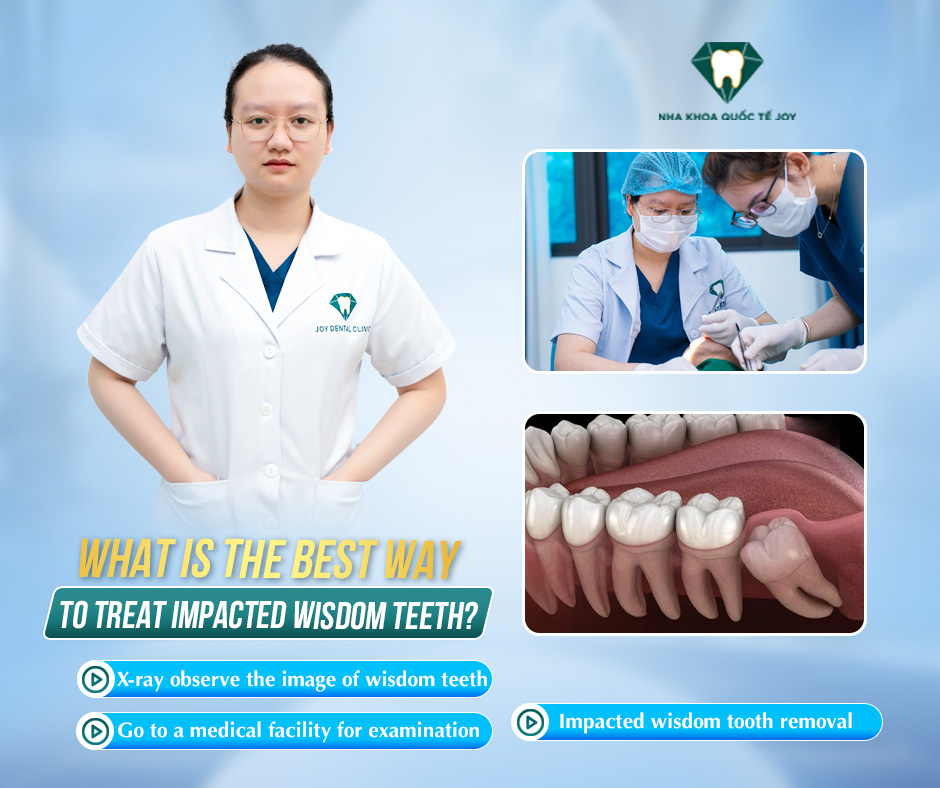Impacted wisdom teeth are a common dental issue among adults. This condition often comes with persistent pain, recurring gum inflammation, and in some cases, serious complications if not addressed promptly. So, what’s the best way to manage impacted wisdom teeth? Let’s explore the detailed insights together with Joy International Dental Clinic in the article below.
1. What Are Impacted Wisdom Teeth?
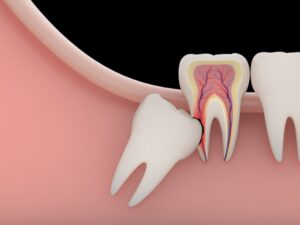
Wisdom teeth, or third molars, are the last set of molars to develop in the human mouth. They usually begin to emerge between the ages of 17 and 25. By this time, however, the jawbone has fully developed and often lacks enough space to accommodate new teeth. As a result, wisdom teeth frequently grow in misaligned, partially emerge, or remain completely embedded beneath the gum.
An impacted wisdom tooth may be entirely lodged within the jawbone or may grow sideways, angling toward the second molar, either inwardly or outwardly. Due to the lack of space, it fails to emerge properly and begins to exert pressure on adjacent teeth. This can lead to pain, inflammation, infection, and in some cases, serious oral health issues.
Unlike regular teeth, impacted wisdom teeth are usually not visible to the naked eye. In most cases, a dental X-ray is required to determine their exact position, direction of growth, and potential impact on surrounding structures.
2. Common Symptoms of Impacted Wisdom Teeth
2.1 Swollen, Inflamed Gums
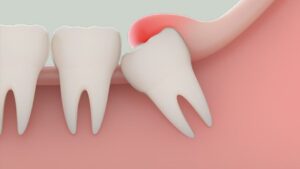
As the impacted tooth begins to push against the gum tissue, the surrounding area may become swollen, red, and tender. This is a common inflammatory response caused by the tooth being trapped beneath the surface. The gums at the far end of the upper or lower jaw can become highly sensitive and prone to irritation during eating, brushing, or flossing.
2.2 Persistent Pain and Sensitivity
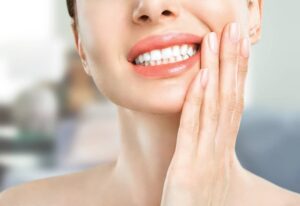
The discomfort from impacted wisdom teeth is not limited to the immediate area. In some cases, the pain may radiate to the jaw, ear, neck, or even cause tension headaches due to nerve compression. This persistent aching and sensitivity can significantly affect daily life, making it difficult to eat or concentrate. The pain may also come and go in waves, often intensifying with weather changes or when consuming hard or extremely hot/cold foods.
2.3 Bad Breath and Bitter Taste
The partial emergence or awkward positioning of an impacted tooth can create small, hidden crevices that trap food particles. These areas are difficult to clean thoroughly, leading to bacterial build-up and the development of halitosis (bad breath) or a lingering bitter taste. In more severe cases, pus formation may occur, indicating infection and tissue damage in the affected region.
3. The Hidden Dangers of Impacted Wisdom Teeth
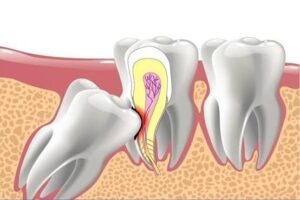
When left untreated, impacted wisdom teeth can cause a variety of complications that go beyond just oral discomfort. Some of the most common risks include:
-
Tooth Decay and Damage to Adjacent Teeth: If the wisdom tooth grows at an angle toward the second molar (tooth #7), it creates a tight space where food debris accumulates. This environment promotes bacterial growth, leading to cavities. In some cases, the second molar may become so damaged that it requires a root canal or extraction.
-
Pericoronitis and Severe Infection: When the gum tissue partially covers the tooth (a condition known as pericoronitis), it creates an ideal breeding ground for bacteria. This can result in swelling, pus discharge, fever, and ongoing pain. If neglected, the infection can spread to surrounding soft tissues or even cause jawbone inflammation (cellulitis).
-
Misaligned Bite and Jaw Deformity: As the impacted tooth applies pressure on nearby teeth, it can cause crowding and misalignment of the dental arch. Over time, this can lead to changes in your facial structure, affecting your bite and making chewing or speaking more difficult.
-
Cysts and Bone Loss: In some cases, fluid-filled cysts may form around the crown of an impacted tooth. If not treated, these cysts can expand, destroy nearby bone, and displace other teeth. Extensive bone resorption may also occur, requiring surgical intervention.
4. What’s the Best Way to Treat Impacted Wisdom Teeth?
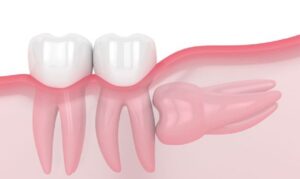
Effective treatment of impacted wisdom teeth should always be conducted by professional dentists. At Joy International Dental Clinic, we follow a standardized medical protocol to ensure your safety and comfort throughout the procedure:
-
Initial Examination and 3D Cone Beam CT Scan: This advanced imaging technique allows for accurate mapping of the impacted tooth’s location, its direction of growth, and its proximity to nerves and other teeth. It provides crucial insights for personalized treatment planning.
-
Consultation and Tailored Treatment Plan: After reviewing the scan results, our dental professionals will explain your situation in detail and recommend the most appropriate treatment option. If the tooth is severely misaligned or poses a risk of complications, extraction is usually advised.
-
Painless Extraction with Piezotome Ultrasonic Technology: At Joy Dental, we use cutting-edge ultrasonic devices that minimize trauma to surrounding tissues, reduce bleeding and swelling, and speed up recovery time. The procedure is performed in a sterile, hospital-grade environment, ensuring maximum hygiene and patient safety.
-
Post-Extraction Care: Patients are given detailed instructions on diet, oral hygiene, and scheduled follow-ups to ensure fast healing and prevent post-operative complications. Our team remains available for consultation and support throughout your recovery process.
Conclusion
Impacted wisdom teeth are more than just a temporary inconvenience—they pose real risks to your oral and overall health. Recognizing the early signs and seeking professional evaluation are key to avoiding long-term complications. If you suspect that your wisdom tooth is impacted, don’t wait. Visit a trusted dental clinic like Joy International Dental Clinic for expert advice and safe, effective treatment.
Have questions or need personalized consultation? Feel free to contact Joy International Dental Clinic for immediate assistance. Your dental health is our top priority.

